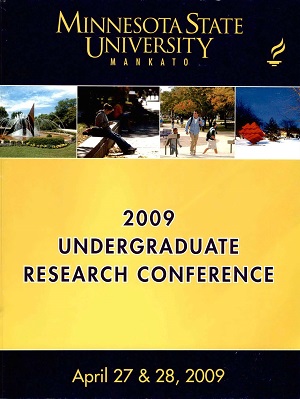Are Stereotypes Inherently Negative? Assessing Activation in Memory for Positive and Negative Stereotypes
Location
CSU Ballroom
Start Date
27-4-2009 1:00 PM
End Date
27-4-2009 3:00 PM
Student's Major
Psychology
Student's College
Social and Behavioral Sciences
Mentor's Name
Karla Lassonde
Mentor's Department
Psychology
Mentor's College
Social and Behavioral Sciences
Description
The influence of stereotypes on behavior and beliefs has been studied extensively in psychology. Early research of stereotypes made use of primarily explicit measures, which examined overt attitudes. Recent studies have examined stereotypes using implicit measures to avoid social desirability. A series of experiments by Lassonde (2008) examined stereotype activation during reading. Participants read passages in which stereotypes were not directly stated but were likely inferred early-on in the passage. Reading time was slowed for subsequent text in which presented information was inconsistent with the inferred stereotype. In the current experiment we assessed whether or not activation of stereotypes would vary as a function of whether the stereotype was either positive or negative. Thirty participants from Minnesota State University, Mankato who were enrolled in introductory psychology courses, read twenty-four passages on a computer screen. The passages contained information about a character which was intended to activate a stereotype. This context was followed by a target sentence in which information was either consistent or inconsistent with the inferred stereotype. The time it took participants to read target sentences was measured. The results replicated earlier work; that is, reading time was slowed for target sentences in which presented information was inconsistent with stereotypes when compared to reading time for target sentences containing consistent information. However, reading time was slower for negative inconsistent target sentences than positive inconsistent target sentences. The implication of these results on our understanding of stereotypes will be discussed.
Are Stereotypes Inherently Negative? Assessing Activation in Memory for Positive and Negative Stereotypes
CSU Ballroom
The influence of stereotypes on behavior and beliefs has been studied extensively in psychology. Early research of stereotypes made use of primarily explicit measures, which examined overt attitudes. Recent studies have examined stereotypes using implicit measures to avoid social desirability. A series of experiments by Lassonde (2008) examined stereotype activation during reading. Participants read passages in which stereotypes were not directly stated but were likely inferred early-on in the passage. Reading time was slowed for subsequent text in which presented information was inconsistent with the inferred stereotype. In the current experiment we assessed whether or not activation of stereotypes would vary as a function of whether the stereotype was either positive or negative. Thirty participants from Minnesota State University, Mankato who were enrolled in introductory psychology courses, read twenty-four passages on a computer screen. The passages contained information about a character which was intended to activate a stereotype. This context was followed by a target sentence in which information was either consistent or inconsistent with the inferred stereotype. The time it took participants to read target sentences was measured. The results replicated earlier work; that is, reading time was slowed for target sentences in which presented information was inconsistent with stereotypes when compared to reading time for target sentences containing consistent information. However, reading time was slower for negative inconsistent target sentences than positive inconsistent target sentences. The implication of these results on our understanding of stereotypes will be discussed.
Recommended Citation
Scheierl, Amber. "Are Stereotypes Inherently Negative? Assessing Activation in Memory for Positive and Negative Stereotypes." Undergraduate Research Symposium, Mankato, MN, April 27, 2009.
https://cornerstone.lib.mnsu.edu/urs/2009/poster-session-B/17




